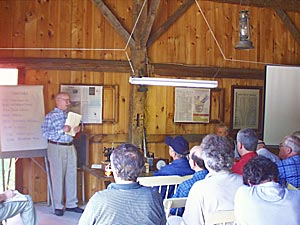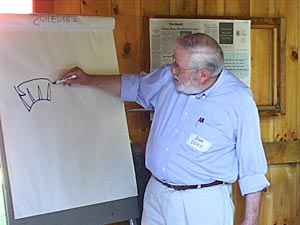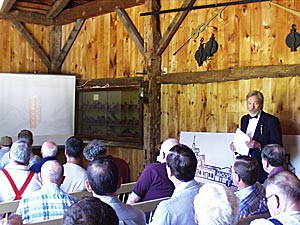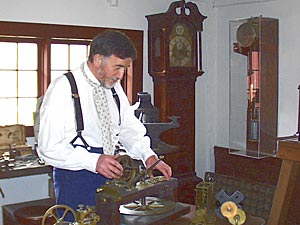New England Chapter No. 8 NAWCC10thANNUAL WILLARD HOUSE WORKSHOP
|
 |
 |
| Dave Deutermann doing the introductions. Dave pointed out the Willard House workshops were started by Joe Brown 10 years ago. | John Losch starting his presentation on repairing the balance escapement in Connecticut shelf clocks. |
 |
 |
| Richard Ketchen gave a slide presentation of his collection of clock and watch repair books, catalogue reprints and albums. | David Gow gave a presentation on repairing those difficult (handmade to fit and nothing standard) antique tall clocks. |
Highlights by Bob Frishman
On a beautiful June 29th in Grafton, Massachusetts, the Willard House & Clock Museum was the site of Chapter 8's tenth annual workshop Forty-two members enjoyed three lecture/demonstrations, box lunches, and a tour of the museum.
Chapter 8 Vice President Dave Deutermann welcomed the attendees, congratulated former chapter president Joe Brown for initiating the workshops a decade ago, and introduced the speakers.
John Losch, long familiar to our chapter and to the NAWCC for his expertise and teaching, gave a detailed presentation on Connecticut balance wheel clocks. Covering both the solid-pallet Seth Thomas style and the pin-pallet variety, he outlined their five major issues: power source, impulse, guard, hairspring and banking. While often described as "junk", these movements are in antique clocks many of us collect and want to run. They were mass-produced cheaply and not to the highest standards, but understanding their basics can help the repairer be successful most of the time. John discussed polishing pallets, truing hairsprings, cleaning bearing cups, adjusting draw and drops, and even the replacement of pallet pins with sewing needles.
Richard Ketchen, also well-known to most of us for his top-quality clock restoration work and prior presentations, offered a slide lecture on horological books. Using his 400-book collection, he discussed the earliest 17th century treatises and then many other important volumes published up to the present day. While some books clearly have bad information, all are interesting and useful. Richard described early French-language books with illustrations of movements and tools found in none of the later literature, and he continues to search out new and rare publications from book dealers and on-line auctions. For fun, he even includes fiction by Thurber, Carolyn Keene, and others who have used clocks in their books' titles and story lines. A photo of his many-tiered bookshelves inspired all of us to continue adding to our own horological libraries.
David Gow, conservator of the clocks at the Willard House Museum, lectured on the philosophy and practices of working on English tall-clock movements. He first proudly announced that he just received his American citizenship (while not rejecting his Scottish heritage) and praised the open sharing and helping spirit he continues to find here among fellow horologists. He then emphasized the need to respect and admire the old English movements, doing nothing to permanently damage them. He claims that just getting them running is not enough or even the most important goal.; restoration is the key. He described recent restorations he has completed, including remaking of screws and clicks, and the use of the depthing tool when bushing to compensate for worn pinions. Clearly he was just warming up when his time was up, so we know that he will again be invited to speak at these annual events in the future.
To cap off a perfect day, we then were invited by John Stephens, curator and director, into the house-museum to view the new exhibit of lighthouse clocks. Stunning examples of Simon Willard's work, as well as later exacting reproductions, were all available for close examination, and we all took time, too, to view again the many fine Willard tall clocks, shelf and banjo clocks, and period artifacts in the restored family homestead.
- Bob Frishman
* * *
Willard House & Clock Museum, 11 Willard St., North Grafton, MA 01536, 508-839-3500
See web site for directions.
7:30 A.M. Registration and morning refreshments
9:00 A.M. First of three 90 Minute lectures begin.
10:30 A.M. Coffee break and snacks
11:00 A.M. Second lecture
12:30 P.M. Catered box lunch
1:00 P.M. Third Lecture
3:00 P.M. Informal visit to the museum
Repairing the balance escapement on a Ct. shelf clock John Losch, FNAWCC
While there is some information available to the repairman on the cheap pin-pallet detached lever clock escapement, this data invariably covers geometry and how it works rather than how to get an inoperative sample to function properly. What is the correct arc of oscillation? Are they all self-starting? What end play on the balance staff? What to oil and not to oil? What can be done with a damaged or missing hairspring? John Losch offers some practical advice on how to approach these questions.
Books on clocks and watches Richard Ketchen, FNAWCC
Most of us have scraped together a motley collection of clock and watch repair books, catalogue reprints and albums of museum collections. But rarely have any of us had access to a 400-volume library on the subject. Richard Ketchen has such a collection, and will describe for us some of books he has found to be most useful throughout his professional career
Repairs unique to the English long case movement David Gow
Those used to overhauling modern triple chime movements generally find that the antique tall clock movement is an altogether different animal. Everything is handmade to fit and nothing is standard. There's nothing in the parts box that will match any of the screw thread systems. Even the brass is different.
Plate thickness varies from point-to-point requiring different bushing lengths. Clicks are not riveted; they are fastened by a threaded stud formed integral to the click. David Gow will discuss some of these aspects of antique movement repair.
Registration for 2002 Willard House Workshop
Registrations @ $35.00 each Total enclosed $______
Name(s)________________________________________________
Street:__________________________________________________
City, State, Zip:___________________________________________
Phone:_______________________E-mail______________________
Mail with check payable to “NAWCC Chapter 8") to Dave Deutermann, 81 Kingman St, Lakeville MA 02347